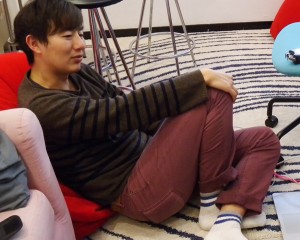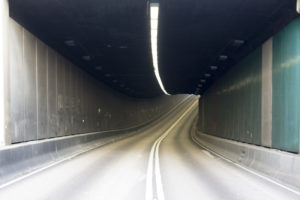Listen 來聽
Interview 採訪:Law Yuk-mui/ 羅玉梅, Liza Chan/ 陳曉盈
Editing 編輯、整理:Law Yuk-mui/ 羅玉梅
English Translation 英譯 : Winnie Chau/ 周潁榆
Transcription 謄錄: Janie Chan Tsang/ 陳錚01/21/2015
Hong Kong/ 香港
Gau Wu, Mong Kok, pebbles, 旺角, 石頭, 鳩嗚
Samson Cheung Choi-sang dreamt of being a farmer, bus drive, football player and geographer but ended up graduating with a Business Administration Degree. Although he couldn’t live in the countryside as he had wished, he thankfully enjoys looking at the sea every day. His creative works address the sea and the interaction between nature and non-nature.
http://www.cheungchoisang.com/

The Library: Let’s start with your recordings.
Samson Cheung: I have recorded a lot of happenings. This may be related to my photography practice. During the Umbrella Movement, I took photographs for United [1]
Social Press for reasons I couldn’t quite explain. I was a bit lazy but I would like to support this event by contributing a small part. But what could I do? Take photographs! At the outset, I hadn’t thought about making sound recordings at all.
The Library: Which means you didn’t have a press pass?
Samson Cheung: No, I didn’t have one. That indeed required some courage. It was very close physically and there was jostling. When a police baton struck, I got to know how to dodge.
The Library: Later, why did you pick up the recorder?
Samson Cheung: As I lost my camera afterwards, I couldn’t shoot anymore. Besides, my view towards the event started to change. As you know, the middle stage of the Umbrella Movement was stagnant. To be very honest, I didn’t know what to shoot. There were people playing, there were some reading in Mong Kok… After all, I am not a journalist. I didn’t want to turn photography into a job, shooting day and night. So, I stopped.
The Library: Was your first recording in Admiralty?
Samson Cheung: Yes. Sometimes, I would stay overnight in Admiralty. I have always wanted to record birds’ twittering, so I recorded birds’ twittering in Admiralty. Yet, the most memorable one among all clips is the recording of throwing pebbles. At first, I only wanted to walk into that tunnel (the tunnel on Connaught Road Central), as I had never been able to walk in a road tunnel freely. At the start, I heard leaves rustle and bob up and down. It was very crisp. I found the space very special and thus I tried to throw pebbles. Actually, throwing pebbles was, in some way, to vent my emotions, because I really didn’t know what I could do. It was like when you drink, you take the opportunity to get drunk as a release.
Throwing Pebbles Inside the Tunnel
07:30AM , 11/22/2014, Connaught Road Central
Later, I would like to record some iconic sounds, such as ‘Gau Wu’ . The day before I recorded the ‘Gau Wu’ clip, there had been a lot of jostling in Mong Kok. That day, I went there in the same frame of mind I would have when I took photographs. I went straight ahead and got very close. When the protesters and the police pushed each other, they ran into the iron gates of the shops and made noises… I thought I had recorded a lot of things, but it turned out I had pressed the wrong button and couldn’t capture anything.
The Library: You’ve taken photographs and then made sound recordings. What do you think are the differences?
Samson Cheung: Actually, the biggest difference is the change of the whole movement. Not until it reached the stage around ‘Gau Wu’[2].took place, did certain sounds appear. The previous chants, such as ‘Down with C.Y. Leung’, ‘Down with 689’ or ‘I want true universal suffrage’, didn’t interest me that much, not until the ‘Gau Wu Revolution’ took place which I found interesting: the sound of people who pretended to have dropped coins and people who echoed the TV commercials outside Mong Kok Broadway Cinema, shouting ‘Siu Laa Baa’ (small trumpet or speaker, also a euphemism for a Cantonese explicit). All these happened after the clearance.
Gau Wu–Mind Your Step’
03:40AM, 11/29/2014, Mong Kok
Dropping Coins
00:29AM, 11/29/2014, Argyle Street, Mong Kok
Freedom, Moses, Little Speaker
08:23PM, 11/28/2014, Mong Kok
The Library: It’s as if your own voice had become a tool of resistance?
Samson Cheung: Right. What makes it interesting is that those people were very excited. Such excitement was a bit like scoring a goal in a football match, where the spectators cheer excitedly to create sound of a sea of people.
The Library: Be it photography or recording, what influence do you think these experiences have brought to you?
Samson Cheung: Honestly, not a great influence. I don’t know how to put it; this isn’t something that I would know in one or two years. I need to look back in a few years’ time. It’s like taking photographs, when I look back now after the Movement, it feels strange. It feels a bit far off.
The Library: This means the Movement seems to have happened a long time ago? What about recording?
Samson Cheung: Yes. Recording feels a bit closer. It may be because it was relatively recent, or that the recordings straddles a longer duration of time. Photos are like temporary memories; as for sound, I don’t even know what it is. And I have no idea at all why people could have come up with things like pretending to have dropped coins[3]. Hong Kong people have an agility of mind. They could derive many slogans from the film trailers on the streets of Mong Kok in no time. Yet, it’s precise that they fail to achieve what they want ultimately, i.e. how can we deal with those issues for the political reform? To me, this is a very big question mark.
[1] United Social Press, or ‘USP’, was founded by a group of freelance photographers to report socio-political issues through photo journalism.
[2] ‘Gau Wu’ (Chinese: 鳩嗚) is a homophonic word of “shopping” in Mandarin (購物 gòu wù) .
[3] Protesters intentionally crossed the road at the green light and pretended to have dropped coins. They stayed on the crossing and shouted slogans.
張才生年少時夢想成為農夫、巴士司機、足球員及地理學家 ,大學卻主修工商管理。盡管未能到嚮往的田園生活,卻慶幸每天能夠望見海。其創作意念也主要環繞海、以及自然與非自然間的互動關係。
http://www.cheungchoisang.com/
聲音圖書館:不如從你的錄音說起。
張才生: 我錄了很多即興的東西,這可能和我拍照有關。雨傘運動期間我幫「社媒」[1]拍照,但為甚麼去拍照,我自己都不知怎麼說好。我有點懶惰,但又想支持這件事, 為這件事出一分力,那我可做些甚麼呢?那就拍照吧! 一開始我是完全沒有想過要錄音的。
聲音圖書館:即是你沒有記者證?
張才生:沒有啊,這的確是需要一些膽量。這麼近的接觸和推撞,見到警棍打下來時,自己要懂得避開。
聲音圖書館:之後,你爲甚麼會拿起錄音機?
張才生: 之後是因為遺失了相機,不能拍了。而且,我開始改變對這件事的想法,你知道雨傘運動中期是一種膠著的狀態。很坦白說,我不知道要拍攝些甚麼,有人在玩、在旺角看書……我始終不是記者,不想將攝影變成工作般日夜都拍,所以我便停了。
聲音圖書館:你第一次錄音在金鐘?
張才生:對,有時我會到金鐘過夜,我經常都想錄小鳥的聲音,於是便錄了金鐘的小鳥聲。但是,在眾多聲帶之中,我最深刻的是擲石那一段。起初我只是想走入那條隧道(干諾道中行車隧道),我從未試過可以在隧道內自由行走。開始時我聽到樹葉在吹、在跳,很清脆;我覺得這個空間很特別,於是便試試擲石。擲石其實有點是宣洩情緒,因為我不知道可以做甚麼,好像喝酒, 趁機醉,發洩一下。
在行車隊道內抛石頭
07:30AM , 11/22/2014, 中區干諾道中
之後,我想錄一些較標誌性的聲音,好像是「鳩嗚」。在錄「鳩嗚」那段聲帶的前一天,旺角發生了很多推撞。那天我抱著平日拍照的心態,衝得很前、很近。示威者與警察推撞時,撞向店鋪鐵閘的聲音……我以為錄了很多東西,誰知按錯了鍵,甚麼都錄不到。
聲音圖書館:你拍過照片,又做了錄音,你覺得有甚麼不同?
張才生:其實我想最大的不同應該是整個運動的轉變。去到某個階段,差不多是「鳩鳴」那個時期才出現某類的聲音。之前喊的那些口號,譬如「打倒梁振英」、「打倒689」或「我要真普選」這些對我來說不是有很大的吸引力。直至「我要去鳩嗚」那一刻,我覺得很有趣,人們過馬路時[2]「扮跌錢」的聲音、跟著旺角百老匯戲院外的電視廣告叫「小喇叭」、「小喇叭」,這些全都是清場後才發生的。
鳩嗚之過馬路要小心
03:40AM, 11/29/2014, 旺角
跌錢
00:29AM, 11/29/2014, 旺角亞皆老街
自由、摩西、小喇叭
08:23PM, 11/28/2014, 旺角
聲音圖書館:好像自己的聲音成為了抗爭工具?
張才生:是啊,有趣的是那些人很亢奮,那亢奮點有點像踢波入球,觀眾會很興奮地叫喊,呈現像人海的聲音。
聲音圖書館:無論是攝影或是錄音,你覺得這些經驗對你有甚麼影響?
張才生:坦白說,影響不會很大。我不懂說,這不是一兩年內可以知道的事,要幾年後,回看才可以知道。好像拍照,運動完了,現在回看,感覺很奇怪,有點像離開了很遠。
聲音圖書館:即是雨傘運動好像是很久之前發生?那錄音呢?
張才生: 錄音感覺會近一點, 可能因為時間上相對近一些,又可能是錄音記錄較長的時間。照片似是暫時的回憶,而聲音我甚至不知道是甚麼。我更不知道為甚麼人們可以想到「扮跌錢」這些事情,香港人腦筋轉得很快,很快便跟著旺角街頭的電影預告想到很多口號,但偏偏最終想要的東西做不到。即是政改那些問題,可以怎樣呢?對我來說,這是一個很大的問號。
[1]社會聯合媒體(United Social Press,USP),簡稱「社媒」,由一群自由攝影師組成。以圖片新聞為方式,報導社會時政議題。
[2] 示威者趁綠燈過馬路時刻意「扮跌錢」逗留馬路並大叫口號。
___________________
Glorious Days, Harmonica, Tempo/ 光輝歲月口琴拍子
04:03AM , 11/29/2014, Yau Ma Tei/ 油麻地
The Trash Can/ 垃圾桶
01:07AM, 11/29/2014, Mong Kok/ 旺角
(Please note that the contents contain language that may be offensive./ 內容含有粗言穢語,敬請注意。)
A Harmonica Song before the Clearance/ 清場前的口琴
10:35AM, 12/11/2014, Admiralty/ 金鐘

The Tunnel on Connaught Road Central/ 干諾道中行車隧道